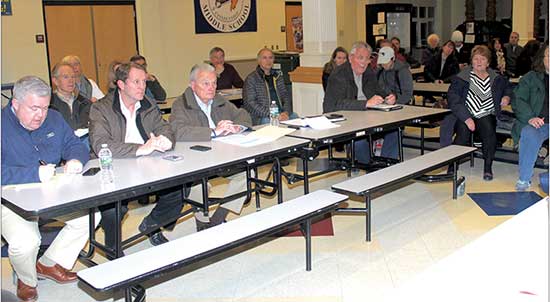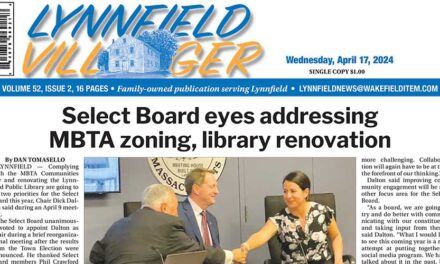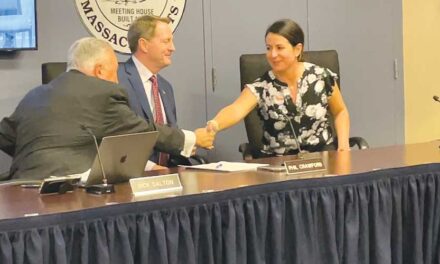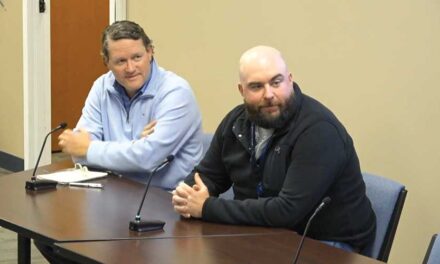Published January 16, 2019
By DAN TOMASELLO
LYNNFIELD — Tensions ran high during the Lynnfield Center Water District (LCWD) Board of Water Commissioners meeting on Monday, as ratepayers railed against the new rate increase and the selectmen requested a special district meeting.
Selectmen Chairman Dick Dalton and a group of residents submitted four citizens’ petitions requesting a special district meeting. Water Commissioners Chairwoman Connie Leccese said the four-article special district meeting will take place on Monday, Feb. 25.
Article 1 seeks to elect a new water commissioner in the wake of retired LCWD Superintendent/Water Commissioner Ken Burnham’s resignation earlier this month.
Article 2 would have the water commissioners appoint the next LCWD superintendent after the district’s annual meeting in April.
According to the petition, Article 3 seeks to increase the LCWD’s filter rebate program for ratepayers with discolored water from $200 to $2,000. Article 3 authorizes the district to spend up to $80,000 on the revamped rebate program.
Lastly, Article 4 would repeal the LCWD’s new rate increase that was passed last year and has angered consumers.
Leccese said the district’s attorney, Chris Casey, will be reviewing the warrant articles Dalton submitted. She said candidates interested in running for water commissioner must submit a letter of intent to the LCWD by Friday, Jan. 25.
“The warrant will close at our regularly scheduled board meeting on Monday, Feb. 11,” said Leccese. “All other submissions for proposed articles on the warrant must be finalized in writing and submitted by that time.”

A LARGE CROWD of angry ratepayers expressed their displeasure with the Lynnfield Center Water District’s rate increase during the Board of Water Commissioners’ meeting on Monday. (Dan Tomasello Photo)
Rate hike wrath
After the brief discussion about the special district meeting, Leccese addressed the district’s new rate increase that has angered a number of ratepayers. She said the Massachusetts Department of Environmental Protection (DEP) suggested the rate increase. She said the rate increase was the equivalent to “peanuts.”
Leccese said the new rate structure for the first 12,000 gallons of water used is $1 per thousand gallons. She said the ratepayers who use between 12,001 and 36,000 gallons would be charged $4.50 per thousand gallons. She said the ratepayers who use between 36,001 and 48,000 gallons would be charged $9 per thousand gallons. She said ratepayers who use 48,001 gallons or more would be charged $18 per thousand gallons.
“Discussions about the new rate structure began in January 2018 as documented in the regular board meetings,” said Leccese. “Discussions continued at almost every regular board meeting and the new rate increases were affirmatively voted during the Sept. 24, 2018 regular board meeting. Ratepayers attending regular board meetings had an opportunity to ask questions about the rate increase and several did ask questions.”
Leccese said ratepayers were notified about the rate increase last July. In addition to promoting water conservation, Leccese said the purpose of the rate increase was to fund a new treatment plant and explore additional water sources. A new treatment plant is not being built at this point and a $250,000 water supply study is underway.
A woman in the audience said she reviewed the water commissioners’ meeting minutes, and said the Sept. 24 minutes stated the rate increase would go into effect on Nov. 1. However, she said the LCWD’s notice last July said the rate increase was going to go into effect on Dec. 1.
“Your motion didn’t make it retroactive, so you can’t retroactively bill people,” the woman said. “It’s wrong. There are people in this room who are facing a serious burden. This is a big burden on our community and it needs to be changed.”
Leccese said the water commissioners will review the Sept. 24 meeting’s minutes.
“If we need to make a modification, we will do so,” said Leccese. “We will review it and will get back to you.”
Trickett Road resident Mark Preston accused the water commissioners of violating the state’s Consumer Protection Law.
“You are basically saying that you’re implementing a higher cost to encourage conservation, but we already consumed the water and utilized it,” said Preston. “It’s like you are a restaurant advertising a hamburger for $2 and charging us $10 after we consume it.”
“Is the DEP advising your hamburger restaurant?” asked Leccese. “This came about from a recommendation from the DEP.”
A gentleman in the audience said the rate increase is higher than what the MWRA charges.
Leccese said the district’s water tax, which is included with residents’ property tax bills, decreased by 12 percent this fiscal year.
A man in the audience said he used 15 percent less water last year and his bill increased “300 percent.”
Selectman Phil Crawford inquired if the water tax “went down or stayed the same” because “the average household in town went up 11 percent.” He also inquired why the tax rate wasn’t reduced in the wake of the water commissioners withdrawing the $5.25 million greensand filter plant project at last December’s special district meeting.
LCWD Treasurer James Alexander said, “The DEP is trying to encourage conservation and remove the burden from the district ratepayer.”
“We shifted some of that burden from those who were paying the tax to those who were using the water,” said Alexander. “It had nothing to do with the greensand filter plant.”
Crawford asked if the rate increase seeks to “penalize the higher use water users.”
“Correct,” said Water Commissioner Richard Lamusta.
A man in the audience said the LCWD “charged me more in six months than in 10 years combined.”
Another man agreed.
“My water bill was $4,100,” said the man. “The only way we would use that much water is if we had CoCo Keys in our backyard.”
Russet Lane resident Stephanie Rauseo wanted to know what the LCWD collected in revenue last year and what the projected revenue is for the coming year.
Alexander said he did not have those figures at the meeting. Leccese said the water commissioners will have that information by their next meeting Jan. 28.
“There is no transparency,” said Preston. “The treasurer doesn’t have the numbers based on collections. That is disappointing.”
After the discussion, the water commissioners voted 2-0 to extend the payment date for water bills for 30 days. However, Crawford noted the Feb. 25 special district meeting will be asking ratepayers to repeal the new rate increase.
Subsequently, the water commissioners voted to amend the original motion by extending the payment date to 60 days.
Legislation debate
Patrice Lane resident Pat Campbell asked Dalton and Crawford if they discussed the proposed LCWD legislative changes with ratepayers or the water commissioners.
“We are not here to answer questions about our actions at our board meetings,” said Dalton.
“I think the voters of the Lynnfield Center Water District should have a say in your decisions before you send them to the Legislature,” said Campbell in response.
LCWD attorney Chris Casey said if the selectmen wanted to make changes to the district’s enabling act, they “went to the correct party to do that.”
“Whether they came before the commission or not is a political issue,” said Casey. “Legally, the only way the enabling act can be changed is by changing the legislation that has been in place for 80 years.”
In response to a question from Campbell, Leccese said the selectmen never discussed changes to the enabling act with the water commissioners.
Former Selectman David Nelson inquired if the proposed legislative changes would change how the Lynnfield Water District operates. The LWD provides water to South Lynnfield.
Dalton said no.
“Are we the only district being targeted?” Leccese asked.
“I don’t think the word targeted is appropriate,” said Dalton in response.




